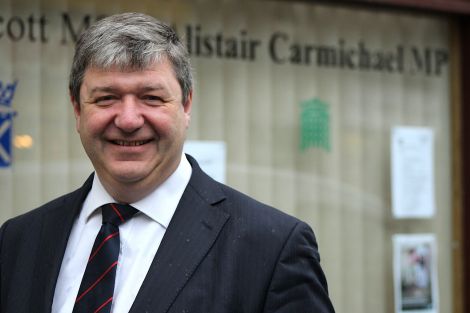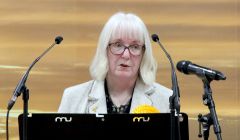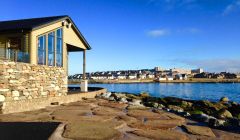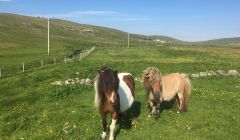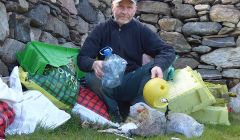Coronavirus / Worries raised over possible transport ‘bottlenecks’ when restrictions ease at Christmas
Northern Isles MP Alistair Carmichael said there is likely to be ‘massive amounts of pressure on plane and ferry services’
PLANS to ease Covid-19 restrictions for five days over Christmas look “quite dangerous” as they are likely to create “bottlenecks” on ferry and air transport to and from the islands, according to Northern Isles MP Alistair Carmichael.
On Tuesday all four UK home nations agreed to allow households to travel across the country and create bubbles of up to three households for five days over the festive period. The measures will be in place from 23-27 December.
Reaction nationally has been mixed, with many scientists saying the measures risk a drastic rise in Covid-19 infections just as the NHS prepares to commence a vaccination programme.
Shetland residents have been able to visit one other household for the past two weeks and the islands remain in “tier one” restrictions.
The Christmas measures will allow three households to meet up in each other’s homes, at a place of worship and in outdoor public spaces, but not in hospitality settings.
While there are currently restrictions on travel in and out of areas in higher tiers, those will be lifted to allow people to be with their families at Christmas.
Carmichael said he was concerned about condensing such travel into a short space of time to and from island communities.
“I think this looks quite dangerous,” he told Shetland News on Wednesday. “It looks to me like you’re going to have a window where people are allowed to travel and come home to Shetland and whatever else, which is maybe fine for people who are looking at going from London to Manchester or Edinburgh to Birmingham when you can just pack up your car and drive from one place to the other.
“But this seems designed, almost, to create bottlenecks where there’s going to be massive amounts of pressure on plane and ferry services, which brings an extra element of risk that wouldn’t be there if you flattened the number of people travelling over a bigger number of days.”
Become a member of Shetland News
The MP said it seemed decision-makers in the UK and Scotland were “ignorant of the practicalities of travel in and out of island communities and haven’t thought to ask the people that would know”.
“It’s another thing that should have been island-proofed but hasn’t been,” he said.
“From the point of view of the airlines and the ferry company as well, they’ve been under the cosh in terms of people travelling, so it would make sense to spread the load over a longer period.”
With hopes that three vaccines will be formally approved within weeks, Carmichael said easing restrictions for Christmas was a difficult “judgement call” where “for some people it’s an unacceptable risk, but Christmas is a time of the year that does mean an awful lot to an awful lot of people”.
Shetland Islands Council leader Steven Coutts said he was sure the prospect of visiting others in their homes would be “welcomed across the country” but he still had “some concerns around travel logistics”.
“There are limited options for people who are travelling some distance to and from Shetland,” Coutts said.
“Clearly travel needs to tie in with ferry and air schedules. We need to ensure that this is considered and accounted for.”
First Minister Nicola Sturgeon said on Wednesday that the measures “will give families some leeway – we all have a desire not to leave loved ones alone at Christmas – but the virus won’t take time off, so please be cautious”.
“If you can, stay at home with your own household. And if not, please treat these limits as a maximum to stay within,” she said.
Professor Devi Sridhar, who is chairwoman of Global Public Health at Edinburgh University and has advised the Scottish Government throughout the crisis, said she thought easing restrictions was a “bad idea” and not something she would be doing personally.
“The virus does not care that it’s Christmas, doesn’t care that it’s a special day,” she told the BBC on Wednesday, adding she would encourage people to meet up and go for a walk outside where the virus is much less likely to spread.
“In the end Christmas is about selflessness, it’s about caring for others, it’s about being together. We can still do those things, we just have to do them in a different way.”
Meanwhile Linda Bauld, professor of public health at the same university, said having people travelling over a “concentrated period” to get to Shetland presented an increased risk.
“[We’ve got] very severe restrictions in the west and central belt where most of the cases still are, and if you’ve got people travelling to Shetland from those areas, which of course is probable, hopefully those restrictions will have had an impact and therefore there will be less chance of the virus spreading.
“But there are other parts of the country – Aberdeen and Aberdeenshire, for example – where cases have risen. I would anticipate there will be additional cases in January and I’m actually particularly concerned about rural and more remote areas, and I don’t want this period to put things at risk for Shetland or anywhere else.”
Loganair chief executive Jonathan Hinkles said the airline was “working hard to ensure that we have sufficient capacity to safely and sensibly meet travel demand over the Christmas period”.
He said: “A number of routes that we’ve suspended this winter, including Glasgow to Kirkwall and Sumburgh, will have special flights over Christmas and New Year both for visiting family and friends as provided for under this new guidance, but also for those travelling for essential purposes.
“We have seats available on all routes and all dates at this time, and every Loganair flight will, of course, have our FlySafe healthy flying protocols in place on the ground and in the air.”
Become a member of Shetland News
Shetland News is asking its readers to consider paying for membership to get additional perks:
- Removal of third-party ads;
- Bookmark posts to read later;
- Exclusive curated weekly newsletter;
- Hide membership messages;
- Comments open for discussion.
If you appreciate what we do and feel strongly about impartial local journalism, then please become a member of Shetland News by either making a single payment, or setting up a monthly, quarterly or yearly subscription.
















